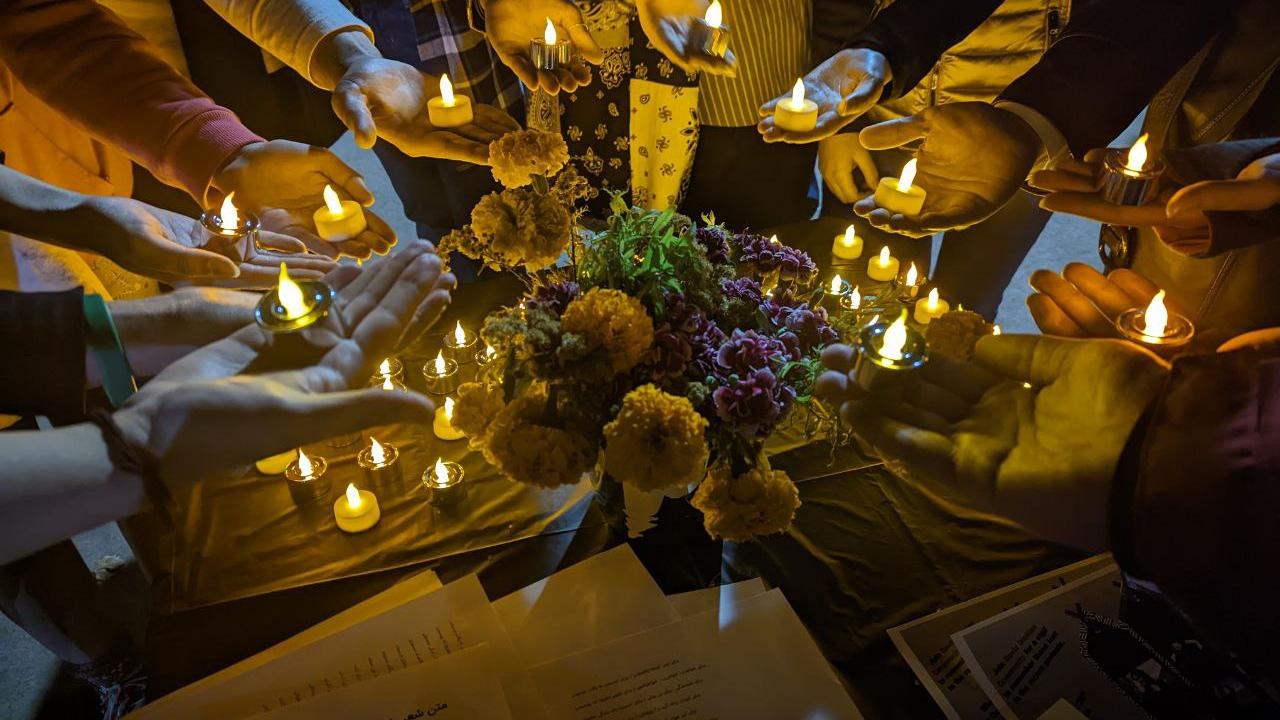
Supporting Iranians’ Fight for Freedom
Ph.D. student Mahya Saffarpour draws courage from protestors in her home country to speak up for the people of Iran
Three Ways to Help The Iranian People
- Keep spreading the word and amplify the Iranian people’s voices.
- Contact your elected representatives to discuss the U.S.’s direct and/or indirect political relationship with Iran.
- Consider signing these petitions gathered by Iranian students of UC Davis.
Find resources and support: Read the university’s statement for those impacted by unrest in Iran.
When doctoral student Mahya Saffarpour accepted the invitation to speak on a UC Davis panel about the current uprising in Iran, she knew it was one more step in her activism that would prevent her from returning to her home country of Iran for the foreseeable future. However, it was something she and other members of the panel were motivated to do to help bring light to the uprising in the country.
“The coverage in U.S. news about Iran’s events—it’s not even scratching the surface at times,” said Saffarpour, who is a Ph.D. candidate in the Department of Computer and Electrical Engineering. “I was happy that I can do a small part to share in the views and voice what’s happening in Iran.”
Understanding the Current Uprising in Iran
On September 13, 2022, a 22-year-old Kurdish-Iranian woman by the name of Masha Jina Amini was arrested and detained by morality police in Tehran for the crime of insufficient hijab. She later died in detention. Many people think Amini was killed.
The outrage and peaceful protests that have followed her death have been met with violent responses from state police in Iran. To date, 402 people associated with the protests in Iran have been killed, including 58 children, and several hundred injured, according to the US-based Human Rights Activists News Agency. Additionally, more than 14,000 have been arrested, according to the United Nations.
On October 27, Graduate Studies co-hosted a panel event called “Understanding the Current Uprising in Iran: Perspectives from UC Davis Faculty and Students.” Panelists discussed these current events, Iran’s recent history, Islamic Law and hijab, and the experience of being a student abroad while one’s home country is in turmoil.

Graduate Studies coordinated the panel discussion with the support of UC Davis Humanities Institute. Other event sponsors included UC Davis’ offices of Global Affairs, Student Affairs, Undergraduate Education, and Diversity, Equity and Inclusion.
Saffarpour shared her and other’s personal stories, gave broader context to current events and offered the 100-plus attendees ways in which they could help support the Iranian people. Other members of the panel also included Amy Motlagh, associate professor of comparative literature and Middle Eastern/South Asian studies and Bita Daryabari, Presidential Chair in Persian Language and Literature; and Mairaj Syed, associate professor of religious studies.
The Suffocating Weight of Silence
Saffarpour shared her personal story of growing up in Iran. She recalled childhood memories of her parents teaching her to avoid saying the wrong things at school, not only to protect herself but also her whole family.
“This burden and pressure started from hiding details of personal behavior or interactions outside school and only amplified when I grew up and understood my surroundings better. When I was a child, it seemed like a confusing contrast between home and school,” she said. “Later, as a grown up, the silence became a suffocating reality when I understood how corrupt the government is and how human rights are violated in Iran on so many levels.”
Saffarpour immigrated to the U.S. in 2017 to attend university and “to get a taste of freedom of speech and expression.” Now that she is in the United States watching the “people who could be my family, they could be people I know” be under attack, Saffarpour feels compelled to use her access to freedom of speech to advocate for others. She is an active member in the UC Davis Iranian Student Association and volunteered to co-lead this panel event to advocate for the Iranian people to the broader world.
Raising Awareness of Daily Violence in Iran
In addition to her own story, at the event Saffarpour also shared stories from fellow Iranian students, such as a young woman who was arrested and harassed by the religious police for nine hours because she was seen wearing white rather than dark attire. Although the woman is safe now as a student in the U.S., the trauma of that ordeal has lingered.
“Their look and words full of contempt and insults… the girls who were crying and shaking because of fear, and the photo that they took of me like a dangerous criminal, are still going through my mind,” says one story author, who requested to remain anonymous for safety concerns. (Read more personal stories from panelists here.)
A Fight Over Freedom, not Religion
Saffarpour wanted the audience to understand the uprising is not about religion, but about reclaiming basic human rights. As an example, Saffarpour described why the law ordering small girls and women to cover their heads and faces with a hijab—a Muslim head covering for women—has become a lightning rod for the protests. The Iranian government has reinvented the Islamic head covering to be a symbol of the government’s oppression of women, according to Saffarpour.
“There have been zero attacks [from protestors] on sacred Islamic symbols, on mosques, on the Quran, on those wearing the hijab. It’s about condemning the mandatory hijab, not the hijab itself,” she said, emphasizing the distinction. “It’s revolting against the dictatorship. It’s not about hijab, it’s about women’s rights and human rights.”
Saffarpour also stressed that, in addition to repressing women, the government is repressing wide swaths of people, including religious minorities like members of the Baháʼí faith. For this reason, Saffarpour says that outraged Iranians are fighting not just for freedoms for women, but also for a society that respects all human rights.
Gaining Courage From Others
Saffarpour says she has been emboldened to participate in events like the Graduate Studies panel event after watching protesters in Iran who are risking their lives to challenge the current government.
“Seeing people in Iran protesting, where there is real danger, gives me courage and hope. I try to experience the freedom and I know I have to be their voice,” she said. “They are inspiring and courageous beyond understanding. I’ve seen what happens in Iran when protests take place, and I cannot express enough how unbelievably vicious and brutal the Islamic Republic is and how hard it is to be this courageous.”
